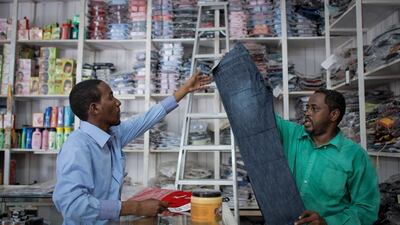Over the past two decades, Somalia has become synonymous with the concept of a failed state. The overthrow of military dictator Mohamed Siad Barre and the collapse of the central government in 1991 threw it into a state of protracted civil war, with a subsistence economy and virtually no functioning institutions, public or private. But things have begun to change and there are signs of recovery.
Politically, since mid-2012, Somalia has had a formal constitution and a federal government. With foreign assistance, its military is pushing back against Al Shabab, which wants to overthrow the government. This week, the United States conducted air strikes against an unidentified “senior leader” of Al Shabab, two days after another of its leading figures, Zakariya Ahmed Ismail Hersi, surrendered to police. Hersi had a price of $3 million (Dh11m) on his head.
Military success is one thing, public confidence is another. One of the first indicators of a return to normality came two years ago, when former Dubai airport worker Mohamed Mahamoud Sheik opened a dry-cleaning store in the capital, Mogadishu. He was among the first to see a business opportunity where once there was only lawlessness and an absence of hope. A year ago, Mr Sheik noticed that love was blooming among Somalis but they could only buy artificial flowers. So he started to sell fresh flowers.
This week comes news that the country’s first insurance company in more than 20 years has opened its doors in Mogadishu. The First Takaful and Re-Takaful Insurance Company will offer life, car and house insurance in line with Islamic principles. In a failed state, it is impossible to assess actuarial risks. For example, the high prevalence of hand-grenade attacks on cars had made them uninsurable. The fact that somebody is now prepared to offer insurance on property and human lives – and believes it to be a workable business model – is significant.
There is a long way to go before Somalia recovers completely from years of war and deprivation, but every small sign that the country is getting back on track is well worth celebrating.

